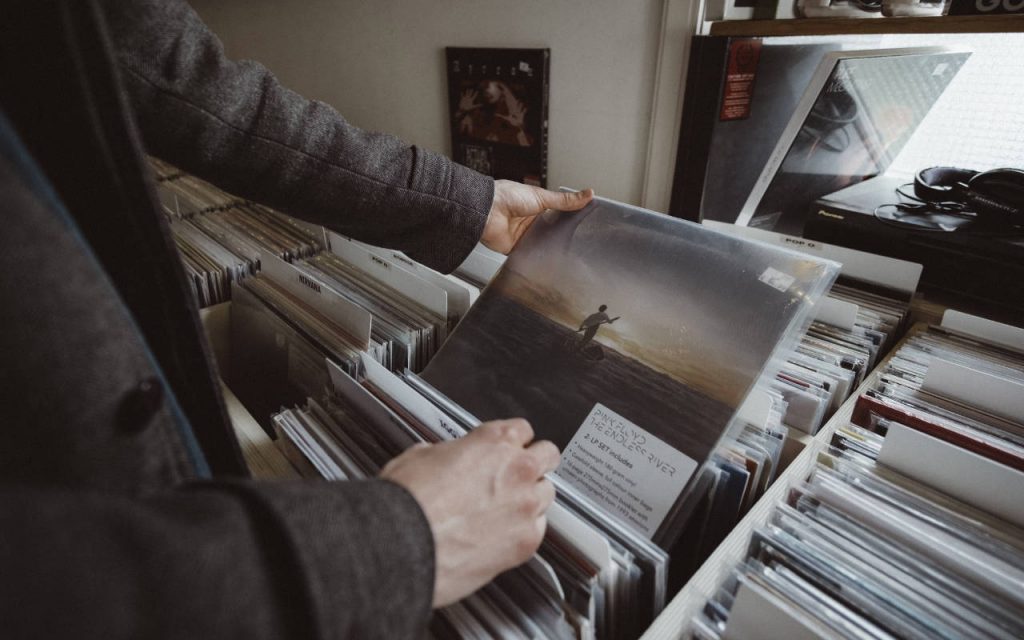The music industry is a very strange one indeed. And not just for the weird and wonderful artists that have come and gone over the years! The tech behind consumer music playback has been a wild ride, and today’s landscape is dominated by digital.
Some of us are old enough to remember when cars made the switch from 8 track players to cassette tape players, then to CD players – before finally arriving at the Bluetooth and streaming combo we have today.
But before all of that, all music came on gramophone (or phonograph) records; the dominant format for playing back music over the majority of the 20th century. They sounded great, and were cheap to make (well, after the heavy initial investment for the means of production for cutting records).
But they were super easy to break. Records were made of shellac in the early days – a natural resin secreted by insects on trees which found loads of commercial uses. Later in the 20th century, production switched to polyvinyl chloride (PVC), which is where vinyl records get their name.
Vinyls were way less prone to breaking, could be more densely filled with music, and could potentially last for centuries if cared for properly. But vinyl has its downsides. It’s a soft material, and so scratches readily – which could result in a “broken record”, where a groove is looped over and over. Sunlight, heat and dust can all damage vinyl records, affecting playback.
It’s no surprise that CDs and other digital formats took over. Not only is digital audio far more high fidelity, it’s cheaper to reproduce and easier to store than its analogue counterparts.
But after falling out of favour in the 1990s, vinyl records have spent the last decade making a phenomenal comeback. By 2031, the market is expected to be worth $30.6 billion US dollars. Not at all bad for “dead tech”.
Still, this analogue medium needs to be protected in order to be worth anything – and there’s only one packaging material up to the job: polythene sleeves. And as record sales continue to skyrocket, so too does the humble polythene sleeve.
But what are polythene sleeves – and how are they better than other solutions?

What are polythene sleeves?
Polythene sleeves are basically just specialised polythene bags – super narrow, with specialist polythene additives mixed into the masterbatch for better function. Polythene sleeves offer major advantages over other materials, particularly for protecting vinyl records.
While superior to their shellac predecessors, vinyl records are still sensitive old things, and while you might find many records in their original cardboard albums, you won’t find many in perfect condition without a further protective covering of some sort. There have been other materials used in the past – but read on to find out why polythene beats them all.
Why are polythene sleeves used to protect vinyl records?
Vinyls can become unplayable if they attract too much dust – which can clog the grooves causing skipping, and contribute to uneven wear and tear of the record. Sure, you can clean the dust off, but for all the good things it can do, PVC has one property that makes this difficult; it is incredibly easy to impart a static charge on it.
This means that it will, through normal use, become charged in a way that will attract dust particles of the opposite charge to stick to it. Much like how electronic devices seem to attract more dust than anything else in your home, vinyl records are dust magnets. And that’s not good news for something so sensitive to dust!
Old dust covers used to be made of PVC. But that really just compounds the problem.
Polythene can be blended with anti-static and high-slip additives. Antistatic additives help alleviate dust accumulation in the packaging, while a high-slip additive will reduce the buildup of static charges in the first place.
PVC sleeves can introduce other problems, too. Being a like-for-like material to the record itself, it has a tendency to stick. This can degrade the playing surface – ”misting” it, and causing deterioration of sound quality.
PVC has another disadvantage; sensitivity to sunlight. Polythene sleeves can be made with UV inhibitors, blocking out the harmful spectrum of light – and if lightly coloured, will reflect away the heat that can cause warping, too.
Learn more: Polythene Additives: What They Do And When To Use Them
Polypropylene (PP) sleeves are another common material, due to their high transparency and glossy finish, which makes more iconic vinyls look amazing. Polypropylene is less flexible than polythene – and folds and wrinkles can be marked in permanently. It’s not anti-static, and being perfectly clear, offers no protection from light.
Weighing all of this up, it’s clear that polythene sleeves are the best option for protecting vinyl records. But that’s not all they’re good for.
Not just for records…
Polythene sleeves aren’t just a one-trick pony. They’re super versatile, thanks to their flexibility and acceptance of additives. Beyond records, they find use in protecting various items – from important documents to precious artworks. Their durability, inertness and clarity make them a go-to choice for preserving and showcasing a wide range of collectibles – like movie posters, trading cards and other memorabilia.
Custom polythene sleeves can be tailored to fit any specific packaging need, offering a snug and secure fit for items of all shapes and sizes. Whether it’s for retail products or special editions in print, custom polythene sleeves are the last word in protection.
Polythene sleeves – a professional packaging solution
Order polythene sleeves as a professional packaging solution – for anything from vinyl records to specialist goods. With custom blends and additives available, you’ll get the best possible protection for your needs.
Get a quote now or call us on 01773 820415 to start your order.


